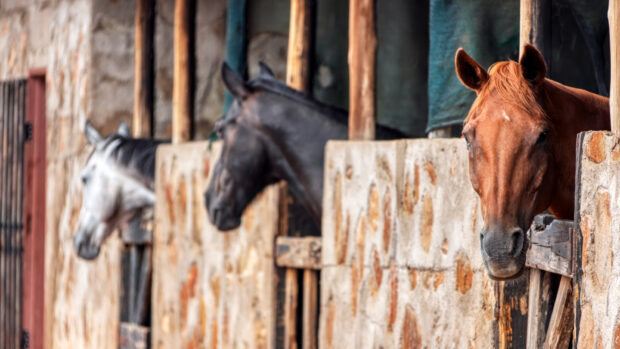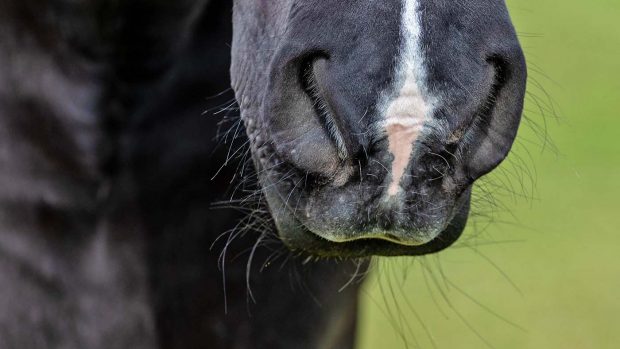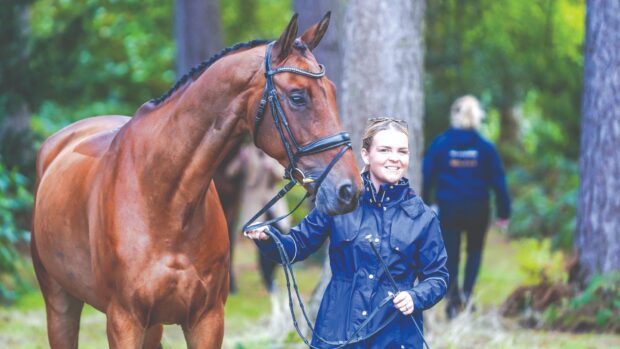Strict isolation and testing rules have been put in place by equestrian sport’s governing bodies to prevent the spread of a “rapid evolution of a very aggressive” strain of equine herpes virus (EHV-1) to the UK herd.
British Eventing (BE) and British Dressage (BD) have the same protocols in place as those recently announced by British Showjumping (BS).
These apply to any individuals or yards that have horses returning from, or travelling through France, Spain, Portugal, Belgium, Italy, Austria, Poland, the Netherlands, Germany and Slovakia. Qatar is also listed on the BD protocol page.
The rules apply as of 1 March to every horse on any UK premises where horses have recently travelled from, or through, a number of nations — not just those horses who have travelled from abroad. They involve 28 days of isolation, with no horses showing any clinical signs, or each horse must record two clear sets of tests, taken 10 days apart, before any horses on that premises can return to affiliated competition or training.
It is “strongly urged” that horses who have returned from, or travelled through, any nations on the list are isolated from other equines, that strict biosecurity measures are in place, and that they are attended to by separate staff and riders who do not have contact with any other horses.
The protocols also ask that all horses on the premises are closely monitored for clinical signs and temperatures taken and recorded twice daily.
The measures are in response to a number of cases on the European mainland, linked to an outbreak in Valencia.
Article continues below…
You might also be interested in:

Equine herpes virus – all you need to know right now

Subscribe to Horse & Hound magazine today – and enjoy unlimited website access all year round

‘Minimal risk’ of EHV-1 spread in the UK but riders urged to act ‘responsibly’
“This episode serves as a reminder of the importance of biosecurity, vaccination and having plans in place for protecting horses
“BD, and all the [British Equestrian (BEF)] member bodies, are working with the leading UK specialist in equine disease, the BEF veterinary advisory group, the equine infections diseases advisory group and the British Equine Veterinary Association to ensure that appropriate measures and guidance have issued to all vets and participants in all areas of equine activity in UK,” said a BD spokesman.
“The BEF is also in communication via our veterinary advisors with the horseracing and breeding industries, who are liaising directly with their participants to give industry-wide co-ordination.
“British Equestrian protocols, which are being adopted by each discipline, are now in place for any riders returning to the UK from Europe, including foreign riders based here, in a bid to prevent any spread of the virus.
“We have provided any riders we are aware of who have been in Europe recently with a copy of the protocols. Anyone who is bringing horses from Europe at this time (purchase, training, stud work, etc) should follow the protocols and strict biosecurity measures to safeguard our equine population.”
British Horseracing Authority director of equine health and welfare James Given has contacted the National Trainers’ Federation, to urge trainers whose staff have links with showjumpers to be extra vigilant and ensure extremely high standards of biosecurity.
The full BEF protocols, as released by each governing body, can be found on the British Eventing, British Dressage and British Showjumping websites.
Horse & Hound magazine, out every Thursday, is packed with all the latest news and reports, as well as interviews, specials, nostalgia, vet and training advice. Find how you can enjoy the magazine delivered to your door every week, plus options to upgrade to access our H&H Plus online service which brings you breaking news as it happens as well as other benefits.




